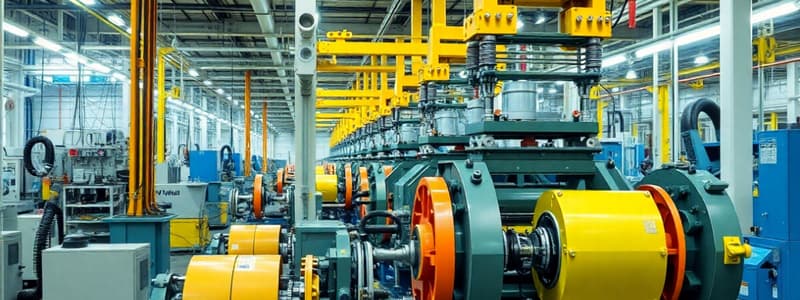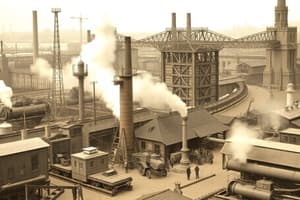Podcast
Questions and Answers
What was a significant innovation that contributed to the mechanization of textile manufacturing during the production era?
What was a significant innovation that contributed to the mechanization of textile manufacturing during the production era?
- Mechanical Cotton Gin
- Industrial Sewing Machine
- Spinning Jenny (correct)
- Electric Loom
Which of the following economic shifts occurred as a result of the industrialization period?
Which of the following economic shifts occurred as a result of the industrialization period?
- Decline of wage labor society
- Rise of agrarian economies
- Reversion to barter systems
- Transition to industrial economies (correct)
What was one of the major social changes that resulted from urbanization during the production era?
What was one of the major social changes that resulted from urbanization during the production era?
- Improvement of rural living conditions
- Migration from cities to rural areas
- Decrease in factory jobs
- Emergence of a working class (correct)
Which of the following was a significant challenge faced by workers during the industrialization period?
Which of the following was a significant challenge faced by workers during the industrialization period?
Which innovation was crucial for advancing transportation during the production era?
Which innovation was crucial for advancing transportation during the production era?
What is a primary characteristic of mass production?
What is a primary characteristic of mass production?
Which of the following best describes the assembly line process in mass production?
Which of the following best describes the assembly line process in mass production?
What is one major disadvantage of mass production?
What is one major disadvantage of mass production?
How does mass production contribute to cost reduction?
How does mass production contribute to cost reduction?
What impact did mass production have on industries in the early 20th century?
What impact did mass production have on industries in the early 20th century?
Which area of environmental concern is associated with mass production?
Which area of environmental concern is associated with mass production?
What modern advancement is enhancing mass production techniques today?
What modern advancement is enhancing mass production techniques today?
What is a significant effect of implementing automation in mass production?
What is a significant effect of implementing automation in mass production?
Study Notes
Production Era: Industrialization
-
Definition:
- A period characterized by the mass production of goods and mechanization of labor.
-
Timeframe:
- Late 18th century to early 20th century, beginning with the Industrial Revolution.
-
Key Features:
- Mechanization: Transition from hand production methods to machines; increased efficiency and productivity.
- Factory System: Centralized production in large facilities that employed numerous workers under one roof.
- Standardization: Development of uniform processes and interchangeable parts, making production faster and reducing costs.
-
Major Innovations:
- Steam Engine: Enabled significant advancements in transportation and factory machinery.
- Spinning Jenny: Revolutionized textile manufacturing by increasing the amount of yarn produced.
- Power Loom: Automated the weaving process, furthering textile efficiency.
-
Impact on Society:
- Urbanization: Migration from rural areas to cities for factory jobs, leading to rapid urban growth.
- Labor Changes: Rise of wage labor; emergence of a working class often subjected to poor working conditions.
- Economic Shifts: Transition from agrarian economies to industrial economies; growth of capitalism.
-
Challenges:
- Working Conditions: Long hours, low wages, and unsafe environments; led to labor movements and demands for reforms.
- Environmental Impact: Pollution and resource depletion due to unregulated industrial activities.
-
Historical Significance:
- Laid the groundwork for modern economic systems and influenced subsequent eras, including the sales and marketing focus in later production strategies.
The Production Era: Industrialization
- Characterized by mass production and mechanization of labor
- Began during the Industrial Revolution in the late 18th century and lasted until the early 20th century
- Saw the rise of the factory system, where large numbers of workers were employed in centralized production facilities
- Standardized processes and interchangeable parts made production faster and cost-effective, significantly impacting society and the economy
Key Innovations
- The invention of the steam engine fueled advancements in transportation and factory machinery
- The Spinning Jenny revolutionized textile manufacturing by increasing yarn production capabilities
- The Power Loom automated weaving, further enhancing textile efficiency
Societal Changes
- Large-scale urbanization occurred as people moved from rural areas to cities for factory jobs
- The rise of wage labor led to the emergence of a working class often subject to poor working conditions
- Transitioned from agrarian economies to industrial economies, fueled by the growth of capitalism
Challenges
- Long working hours, low wages, and unsafe working environments were common in factories
- These problems led to labor movements and demands for reforms
- Unregulated industrial activity resulted in environmental pollution and resource depletion
Historical Significance
- Laid the foundation for modern economic systems
- The emphasis on production methods impacted later eras, including the focus on sales and marketing in subsequent production strategies
Mass Production
- A manufacturing method that produces large quantities of standardized products.
- Emerged during the Industrial Revolution.
- Emphasized in the 20th century with industries like automobiles and consumer goods.
Key Features of Mass Production
- Standardized products with minimal variation.
- Assembly line production for efficiency.
- Automated machinery for repetitive tasks.
Advantages of Mass Production
- Increased efficiency through streamlined processes.
- Lower cost per unit due to economies of scale.
- Consistent product quality through standardized processes.
Disadvantages of Mass Production
- Limited flexibility due to rigid processes.
- Monotonous work leading to worker dissatisfaction.
- Environmental impact due to increased waste and resource consumption.
Impact of Mass Production on Business
- Transformed industries by enabling mass consumption.
- Influenced supply chain and inventory management practices.
- Laid the groundwork for modern manufacturing and production management.
Examples of Mass Production
- Ford Motor Company's moving assembly line in 1913 transformed automobile manufacturing.
- Consumer electronics like televisions and appliances utilize mass production for efficiency.
Modern Relevance of Mass Production
- Continues to evolve with advancements in technology like robotics and 3D printing.
- Integrates concepts like lean manufacturing and just-in-time production for optimization.
Studying That Suits You
Use AI to generate personalized quizzes and flashcards to suit your learning preferences.
Description
Explore the key features and innovations of the Production Era, marked by industrialization from the late 18th century to early 20th century. Understand the transition to mechanized labor and the impact of factory systems on society, including urbanization and productivity changes.




